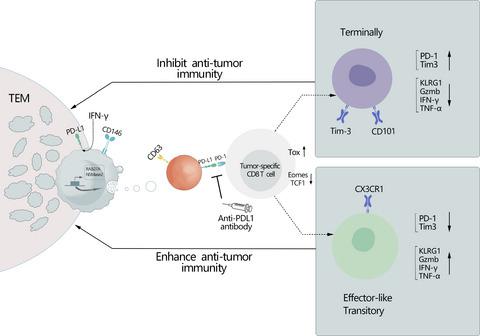当前位置:
X-MOL 学术
›
Cancer Sci.
›
论文详情
Our official English website, www.x-mol.net, welcomes your
feedback! (Note: you will need to create a separate account there.)
PDL1-positive exosomes suppress antitumor immunity by inducing tumor-specific CD8+ T cell exhaustion during metastasis
Cancer Science ( IF 4.5 ) Pub Date : 2021-06-21 , DOI: 10.1111/cas.15033 Ji Chen 1 , Yang Song 1 , Feng Miao 1 , Gang Chen 1 , Yongjun Zhu 1 , Ning Wu 1 , Liewen Pang 1 , Zhiming Chen 1 , Xiaofeng Chen 1
Cancer Science ( IF 4.5 ) Pub Date : 2021-06-21 , DOI: 10.1111/cas.15033 Ji Chen 1 , Yang Song 1 , Feng Miao 1 , Gang Chen 1 , Yongjun Zhu 1 , Ning Wu 1 , Liewen Pang 1 , Zhiming Chen 1 , Xiaofeng Chen 1
Affiliation

|
Metastasis is the main cause of death in individuals with cancer. Immune checkpoint blockade (ICB) can potentially reverse CD8+ cytotoxic T lymphocytes (CTLs) dysfunction, leading to significant remission in multiple cancers. However, the mechanism underlying the development of CTL exhaustion during metastatic progression remains unclear. Here, we established an experimental pulmonary metastasis model with melanoma cells and discovered a critical role for melanoma-released exosomes in metastasis. Using genetic knockdown of nSMase2 and Rab27a, 2 key enzymes for exosome secretion, we showed that high levels of effector-like tumor-specific CD8+ T cells with transitory exhaustion, instead of terminal exhaustion, were observed in mice without exosomes; these cells showed limited inhibitory receptors and strong proliferation and cytotoxicity. Mechanistically, the immunosuppression of exosomes depends on exogenous PD-L1, which can be largely rescued by pretreatment with antibody blockade. Notably, we also found that exosomal PD-L1 acts as a promising predictive biomarker for ICB therapies during metastasis. Together, our findings suggest that exosomal PD-L1 may be a potential immunotherapy target, suggesting a new curative therapy for tumor metastasis.
中文翻译:

PDL1阳性外泌体通过在转移过程中诱导肿瘤特异性CD8+ T细胞耗竭来抑制抗肿瘤免疫
转移是癌症患者死亡的主要原因。免疫检查点阻断 (ICB) 可以潜在地逆转 CD8 +细胞毒性 T 淋巴细胞 (CTL) 功能障碍,导致多种癌症的显着缓解。然而,转移进展过程中 CTL 耗竭发展的潜在机制仍不清楚。在这里,我们用黑色素瘤细胞建立了一个实验性肺转移模型,并发现了黑色素瘤释放的外泌体在转移中的关键作用。使用外泌体分泌的两种关键酶nSMase2和Rab27a 的基因敲低,我们发现高水平的效应样肿瘤特异性 CD8 +在没有外泌体的小鼠中观察到 T 细胞具有暂时性耗竭,而不是终末耗竭;这些细胞显示出有限的抑制性受体和强烈的增殖和细胞毒性。从机制上讲,外泌体的免疫抑制依赖于外源性 PD-L1,这在很大程度上可以通过抗体阻断预处理来挽救。值得注意的是,我们还发现外泌体 PD-L1 在转移过程中作为 ICB 治疗的有希望的预测生物标志物。总之,我们的研究结果表明外泌体 PD-L1 可能是一个潜在的免疫治疗靶点,为肿瘤转移提供了一种新的治疗方法。
更新日期:2021-06-21
中文翻译:

PDL1阳性外泌体通过在转移过程中诱导肿瘤特异性CD8+ T细胞耗竭来抑制抗肿瘤免疫
转移是癌症患者死亡的主要原因。免疫检查点阻断 (ICB) 可以潜在地逆转 CD8 +细胞毒性 T 淋巴细胞 (CTL) 功能障碍,导致多种癌症的显着缓解。然而,转移进展过程中 CTL 耗竭发展的潜在机制仍不清楚。在这里,我们用黑色素瘤细胞建立了一个实验性肺转移模型,并发现了黑色素瘤释放的外泌体在转移中的关键作用。使用外泌体分泌的两种关键酶nSMase2和Rab27a 的基因敲低,我们发现高水平的效应样肿瘤特异性 CD8 +在没有外泌体的小鼠中观察到 T 细胞具有暂时性耗竭,而不是终末耗竭;这些细胞显示出有限的抑制性受体和强烈的增殖和细胞毒性。从机制上讲,外泌体的免疫抑制依赖于外源性 PD-L1,这在很大程度上可以通过抗体阻断预处理来挽救。值得注意的是,我们还发现外泌体 PD-L1 在转移过程中作为 ICB 治疗的有希望的预测生物标志物。总之,我们的研究结果表明外泌体 PD-L1 可能是一个潜在的免疫治疗靶点,为肿瘤转移提供了一种新的治疗方法。































 京公网安备 11010802027423号
京公网安备 11010802027423号